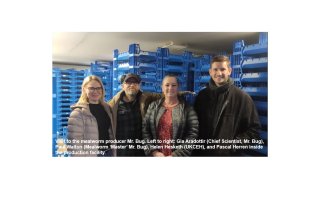
category_news
Overcoming obstacles and expanding my horizons: Highlights of my PhD journey
A lot has happened since my last update in January 2022. I completed my practical work at the UKCEH (UK Centre for Ecology & Hydrology, Oxfordshire), moved to a new city, visited a mealworm producer, and last but not least I attended several conferences and courses which allowed me to travel through Europe. Here are some of the highlights of my PhD journey so far.
One of the questions I would like to answer in my work is how carbon dioxide (CO2) affects insect-pathogen interactions. The major challenge I encountered during this study was setting up an experimental system that would allow me to perform my experiments. Initially, we planned to use climate-controlled rooms for the experiments, but we soon realised that this was not feasible due to low CO2 concentrations and fluctuating relative humidity, which would have introduced another uncontrollable stressor to my experiments. We then decided to use smaller incubators in which the CO2 concentrations could be elevated to the desired levels. However, this presented a new obstacle because the insects themselves generated enough CO2 to increase the concentrations inside the incubators. To overcome this, I designed a ventilation system that maintained stable CO2 levels inside the incubators. Fortunately, despite my lack of engineering background, I was able to overcome these challenges and conduct all the planned experiments successfully.
Aside from conducting extensive experimental work, I had the opportunity to travel to various locations for other opportunities. One highlight was visiting ‘Mr. Bug’ (https://www.mrbug.co.uk/) together with my supervisor Helen Hesketh. This company specialises in producing yellow mealworm protein-based dog treats for the pet food industry. During our visit, we had the pleasure of touring their facility and engaging in stimulating discussions with their team. It was very motivating to see that my experiments and findings are relevant to the insect production industry and for the producers to explain the practicalities and challenges of rearing insects.
Later in February, I had to say goodbye to my dear friends and colleagues at UKCEH and I packed my belongings to move to the third and last station of my PhD journey, which is Leeds. At the University of Leeds, I received a warm welcome from my supervisor Alison M. Dunn and the lovely people in her group, who helped me to settle in quickly. In Leeds, I am focusing on the data analysis of my last two chapters and writing up my thesis. However, I have also lined up some welcome distractions from writing, such as INSECT DOCTORS courses in France in May, a visit to the company YNSECT, and the participation in the annual conference of the Society of Invertebrate Pathology in the United States in August. Even though, there is still a lot of work to complete before submitting my thesis, I am excited and motivated to tackle this final stage of my PhD.